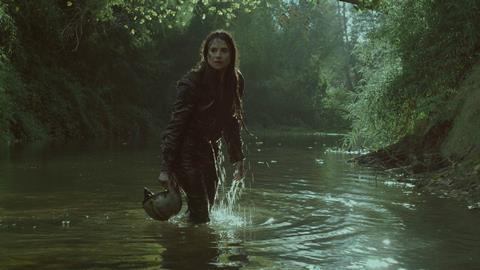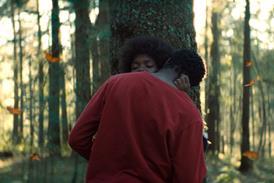Ambitious magical-realist tale from Chile about motherhood and the natural world

Dir: Francisca Alegría. Chile/Francia/US/Germany. 2021. 98 mins
A beautifully eerie and resonant tale about motherhood and the natural world, Francisca Alegría’s The Cow Who Sang A Song Into The Future could just as easily have been called ‘Of Cows and Women’. Solidly grounded, teeming with thought-provoking ideas, wonderfully atmospheric, and often visually striking, this magical realist eco-fable about a dead mother who returns to transform the lives of her dysfunctional family pays the price for its own high ambition and is simply unable to sustain the intensity until the end. But until then, it’s a hypnotic and entrancing ride.
The sheer number of ideas that the script is trying to juggle start to push the story towards incoherence
Cow…, which seems to come from the same place as Andrea Arnold’s shocking bovine-themed 2021 documentary, is essentially a development of the short which won Alegría the Best International Fiction Short Film at Sundance 2017, (And The Whole Sky Fit In The Dead Cow’s Eye). A stunning, beautifully photographed prelude of a poisoned paradise, featuring dead fish on a riverbank, provides the context for the rest of a film in which not only the natural world, but the natural bonds of kinship are struggling for survival.
Magdalena (Mia Maestro) emerges from the water like a river goddess in motorcycling gear: she killed herself years before by riding her bike into a river which is now contaminated with chemicals from a nearby paper mill. (This is a real-life event which Alegría appropriates.)
Magdalena’s daughter Cecilia (Leonor Varela) is a stressed-out surgeon whose relationship with her gender-fluid son Tomas (Enzo Ferrada) is problematic. She is called urgently to hospital following the collapse of her now-elderly dairy farmer father Enrique (Alfredo Castro), Magdalena’s husband, who is claiming to have seen his dead wife.
Taking the family out to the country farm to keep an eye on Enrique, the initially sceptical Cecilia senses a strange shift inside her. Lost on a night-time walk in the woods, she exchanges a mutual, spiritual gaze with a cow, presumably the one of the title — and it’s testament to Alegria’s power in creating her filmic world that such a potentially ridiculous moment does not come across as silly at all.
Meanwhile, through sequences handled with great care and delicacy, Magdalena becomes visible to the other characters, starting, perhaps inevitably, with Cecilia’s lonely daughter Alma (Laura del Rio): we learn that while alive, Magdalena hated the idea that cows should be separated from their calves and exploited by humans for their milk. With her return, Cecilia starts to absorb some of these values and can begin the journey to her own maternal redemption.
As directors of the film adaptations of the novels of Gabriel García Márquez have repeatedly shown, magical realism works better in words than on screen, because surreal events tend to be felt more credibly in mental images than in filmed ones. Despite this, Alegría, photographer Inti Briones (often cannily framing technology and nature in the same shot) and art director Bernardita Baeza do terrifically persuasive work through the first half of the film, when things are being set up.
But through its final stretch the sheer number of ideas that the script is trying to juggle start to push the story towards incoherence, giving some scenes a perfunctory feel. Some past events, such as the actual reasons why Magdalena killed herself, are tossed out briefly without being worked through, while a strand involving a physical exchange between a Mapuche motorcyclist and the long-dead Magdalena feels as though one PC theme too many has been shoehorned in.
Varela successfully brings across the subtle changes that are occurring inside Cecilia, while Maestro is superbly expressive in an almost wordless role. In Alegría’s world people must both communicate and compete with creatures, and the director shows skill and sensitivity in depicting the special interactions between the characters and the cows, in vibrant scenes which are authentically moving.
Production companies: Cinéma Defacto, Wood Producciones, Match Factory Productions, Jirafa Films, ZDF - das Kleine Fernsehspiel, Dialectic
International sales: The Match Factory sales@matchfactory.de
Producers: Tom Dercourt, Alejandra García, Shrihari Sathe, Michael Weber, Viola Fügen, Andrés Wood, Bruno Bettati
Screenplay: Francisca Alegría, Fernanda Urrejola, Manuela Infante
Art direction: Bernardita Baeza
Editing: Andrea Chignoli and Carlos Ruiz-Tagle
Cinematography: Inti Briones
Music: Pierre Desprats
Main cast: Leonor Varela, Mia Maestro, Alfredo Castro, Marcial Tagle, Luis Dubó, Enzo Ferrada
























